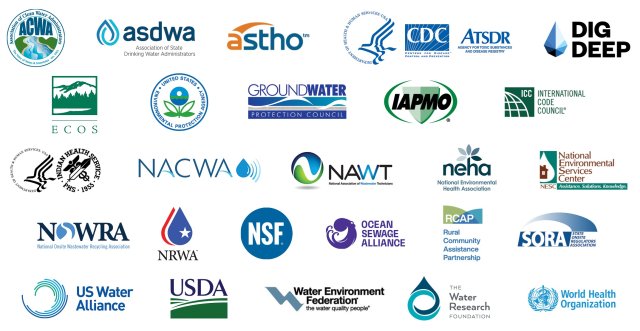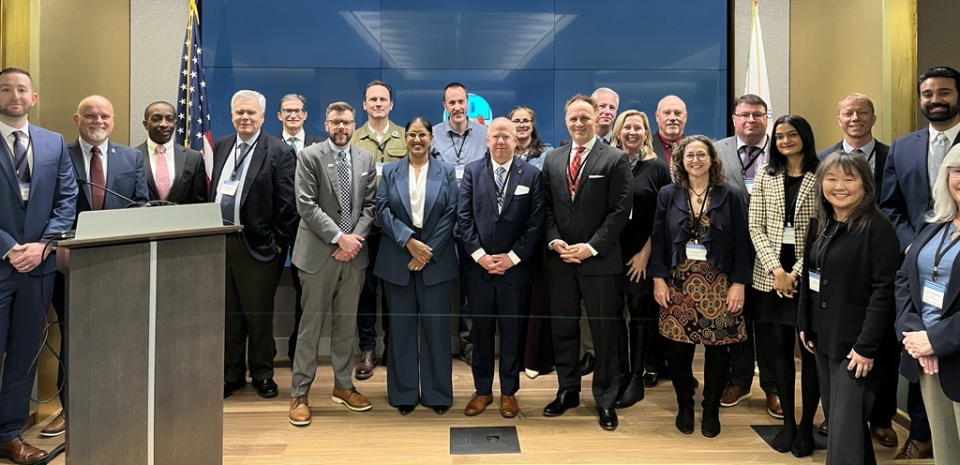EPA's Decentralized Wastewater Partnership

About the Partnership
EPA’s Decentralized Wastewater Management Memorandum of Understanding (MOU) Partnership is designed to improve the overall performance and management of decentralized systems. The Partnership is a collaboration between EPA and national organizations representing practitioners in the decentralized wastewater industry. It began as an initiative between EPA and eight public and private sector organizations in 2005. The Partnership has expanded significantly since then and consists of 25 partners as of December 5, 2023.
The MOU partners work together to facilitate information exchange on system technology, collaborate to support training efforts, promote public awareness on septic system care and maintenance, and produce materials on decentralized systems. The Partnership ensures collaboration at the national level to improve decentralized performance and protect the nation's public health and water resources.
The Decentralized Wastewater Partnership’s MOU is renewed every three years and previously signed in 2020, 2017, 2014, 2011, 2008, and 2005.

Decentralized Wastewater Management MOU Agreements
The 2023 MOU renewed the commitment of EPA and its partner organizations to work together to encourage proper management of decentralized systems and increase collaboration among EPA, state and local governments, and decentralized system practitioners and providers.

Decentralized MOU Signatories, December 5, 2023
Top Row (left to right): Zach Lowenstein (U.S. EPA), Vern Steel (NRWA), Andrew Sawyers (U.S. EPA), Ben Grumbles (ECOS), Stewart Sarkozy-Banoczy (OSA), Kevin Orner (ACTAT), Julia Anastasio (ACWA), Adam Krantz (NACWA), John Ferdetta (NAWT), Matt Sigler (ICC), Jeff Moeller (WRF), Kabir Thatte (Dig Deep).
Bottom Row (left to right): Eric Casey (SORA), Ted Stiger (RCAP), Farah Ahmad (USDA-RD), Harold Chase (NSF), Dain Hansen (IAPMO), Allison Blodig (NOWRA), Heidi Faller (U.S. EPA), Kruttika Gopal (U.S. EPA), Mami Hara (US Water Alliance), Lisa McFadden (WEF).
The original MOU was signed on January 12, 2005, with eight partner organizations. It has since been renewed six times: 2008, 2011, 2014, 2017, 2020, and 2023.
Materials from the past renewals can be found on the following pages:
- 2020 Decentralized Wastewater Management MOU (pdf)
- 2017 Decentralized Wastewater Management MOU (pdf)
- 2014 Decentralized Wastewater Management MOU (pdf)
- 2011 Decentralized Wastewater Management MOU (pdf)
- 2008 Decentralized Wastewater Management MOU (pdf)
- 2005 Decentralized Wastewater Management MOU (pdf)
Partnership Materials
Accomplishments of the EPA Decentralized Wastewater MOU Partnership
This report highlights key accomplishments for the MOU renewal period 2020-2023. The information is from members of EPA’s Decentralized Wastewater MOU Partnership and focuses on the MOU Partnership’s priorities to:
- Increase outreach and public education about decentralized wastewater/septic systems.
- Identify and utilize current information about decentralized wastewater/septic system use and performance in the United States.
- Promote advanced decentralized treatment technologies to the wastewater industry and the public.
- Share information on funding options to help communities and homeowners with decentralized wastewater/septic system repair and replacement.
- Address workforce, education, training and research needs related to the decentralized wastewater industry.
MOU partnership accomplishments for earlier years:
- 2017-2020 MOU Accomplishments (pdf)
- 2014-2017 MOU Accomplishments (pdf)
- 2011-2014 MOU Accomplishments (pdf)
- 2008-2011 MOU Accomplishments (pdf)
Educational Materials
Onsite Wastewater Treatment System Homeowner Education Project
Funded with a grant from EPA and in partnership with the Rural Community Assistance Partnership (RCAP), the National Onsite Wastewater Recycling Association (NOWRA) developed training materials for educating property owners with an onsite wastewater treatment system. Materials consist of an interactive homeowner/public training module for residential owners and the public with best management practices to keep their septic systems functioning properly. While the training’s target audience is property owners who have an onsite system, the concepts are also applicable to the public, realtors, local health officials, and septic system professionals.
Concepts covered in the training course include:
- the importance of wastewater treatment to human and environmental health;
- an overview of treatment in an onsite system and typical onsite system features; and
- onsite wastewater system management, maintenance, safety, and system troubleshooting.
These materials can be customized for the audience, length of time, and regulations. Each module includes slides with speaker notes, activities including a fun “identify the problem” troubleshooting session, pre- and post-test and evaluations, a facilitation guide with an agenda, learning objectives and the activity support documentation and photos and videos of common systems across the U.S. that can be used to customize local training events.
Papers
These position papers were prepared by the Partnership for state, local, and tribal government officials, and interested stakeholders. These materials include information on the uses and benefits of decentralized wastewater treatment and examples of where it has played an effective role in a community's wastewater treatment infrastructure.
- Introduction to Decentralized Wastewater Treatment: A Sensible Solution (pdf)
- Decentralized Wastewater Treatment Can Be Cost Effective and Economical (pdf)
- Decentralized Wastewater Treatment Can Be Green and Sustainable (pdf)
- Decentralized Wastewater Treatment Can Protect the Environment, Public Health, and Water Quality (pdf)
Fact Sheets
- Distributed Systems Overview Fact Sheet (pdf) 158.6 KB)
Joint WEF/WRF/Decentralized MOU Partnership fact sheet provides an overview of decentralized/distributed systems in both rural and urban communities, as well as examples in different geographic regions.
Webinars
EPA's Decentralized Wastewater Management MOU Partnership sponsors periodic webinars about decentralized wastewater treatment to discuss issues of interest to the decentralized community.
